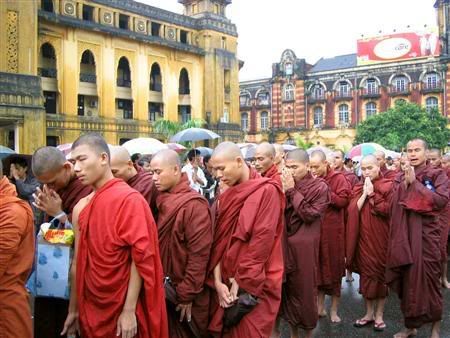http://www.counterpunch.org/mariner06072003.html June 7, 2003
Ashcroft Sides with Torturers
Unocal and the Crimes of Burma
By JOANNE MARINER
Given the chance to protect corporate interests, the Bush administration is predictably happy to take it. Ditto for the prospect of undermining international justice.
But it's not every day that the opportunity arises to accomplish both objectives at once. It takes a case like John Doe I v. Unocal Corp., a civil damages action currently pending in U.S. federal court.
In a brief recently filed in the Unocal case, the administration--in the person of Attorney General John Ashcroft--sets out to defend an oil company, reaffirm the president's untrammeled power over foreign policy, and eviscerate a law that has provided a modicum of justice to victims of rights abuses from around the world.
All that, and more. In an added plus, the brief also gives the administration a vehicle for highlighting the wit and wisdom of Robert Bork. Bork, the right wing's original judicial martyr, is very much in the thoughts of an administration that is currently fighting bruising confirmation battles in Congress.
Forced Labor, Murder, Rape and Torture
The plaintiffs in the Unocal case are Burmese villagers who claim that they were subjected to forced labor, murder, rape, and torture during the construction of a gas pipeline through their country. Soldiers allegedly committed these abuses while providing security and other services for the pipeline project.
Jane Doe I, one of the plaintiffs in the case, testified that when her husband tried to escape the forced labor program, he was shot at by soldiers, and that, in retaliation for his attempted escape, she and her baby were thrown into a fire. Her child died and she was badly injured.
Other villagers described the summary execution of people who refused to work, or who became too weak to work effectively.
There is little doubt that such crimes occurred. They have been exhaustively documented by Human Rights Watch, Amnesty International, and a host of other groups. In 1995, when pipeline construction was beginning, the U.N. General Assembly passed a resolution urging Burma (also known as Myanmar) to put a stop to its practices of torture, forced labor and summary executions. Even the Justice Department, whose "friend of the court" brief was filed this past May 8, was willing to acknowledge the "blatant human rights abuses" committed by Burma's military government.
The only serious factual issue in the case is the extent of Unocal's responsibility for the crimes. The plaintiffs claim that Unocal aided and abetted the Burmese military in its campaign of abuse, an assertion that Unocal vigorously denies.
"Practical Assistance"
The Unocal case is now pending before the U.S. Court of Appeals for the Ninth Circuit. The lower court that first heard the case dismissed it, finding insufficient proof of Unocal's involvement in the abuses.
The appeal was heard by a panel of Ninth Circuit judges that ruled unanimously to reverse the dismissal. The court found that the evidence presented by the villagers supported the conclusion "that Unocal gave practical assistance to the Myanmar Military in subjecting Plaintiffs to forced labor."
As the court described it, this practical assistance "took the form of hiring the Myanmar Military to provide security and build infrastructure along the pipeline route in exchange for money or food." The assistance "also took the form of using photos, surveys, and maps in daily meetings to show the Myanmar Military where to provide security and build infrastructure."
Moreover, the court found, the evidence supported the conclusion "that Unocal gave 'encouragement' to the Myanmar Military in subjecting Plaintiffs to forced labor."
Besides ruling for the plaintiffs on the forced labor issue, the court also reversed the district court's dismissal of the murder and rape claims, finding sufficient evidence of Unocal's complicity in those abuses. But the panel decision, issued in September 2002, was vacated in February, when the Ninth Circuit decided to rehear the case en banc (in other words, sitting as a panel of eleven, rather than three, judges).
The Alien Tort Claims Act
Except for a token acknowledgment of the Burmese government's human rights abuses, the Justice Department's brief ignores the facts of the case. Rather than attempting to defend Burma and Unocal on the factual record, it instead aims to destroy the legal basis of the villagers' suit.
In its brief, the Justice Department embarks on a wholesale attack on the Alien Tort Claims Act (ATCA), the law underlying the villagers' claims. For over twenty years, since the landmark 1980 case of Filartiga v. Pena-Irala, courts have ruled that the ATCA permits victims of serious violations of international law abroad to seek civil damages in U.S. courts against perpetrators found in the United States.
The Justice Department's proposed interpretation of the law would radically narrow its scope. The law would be changed so dramatically, in fact, that as the Department itself acknowledges, it would be rendered "superfluous."
If the Ninth Circuit adopts this approach, victims of human rights abuses abroad will no longer be able to rely on the U.S. courts for any hope of justice. And no more will multinational corporations, enticed by other countries' lower wages, laxer worker protections--and, possibly, ineffective and corrupt judicial systems--have to worry that abuses they commit in foreign countries may come back to U.S. courts to haunt them.

AIN'T GONNA LET NOBODY TURN ME AROUND
http://www.democraticunderground.com/discuss/duboard.php?az=view_all&address=389x1896963 Burma is on the Brink of Revolution
http://www.democraticunderground.com/discuss/duboard.php?az=view_all&address=389x1893560